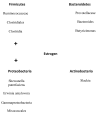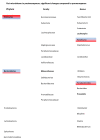How the Gut Microbiome Links to Menopause and Obesity, with Possible Implications for Endometrial Cancer Development (VSports app下载)
- PMID: 34209916
- PMCID: VSports最新版本 - PMC8268108
- DOI: "V体育安卓版" 10.3390/jcm10132916
How the Gut Microbiome Links to Menopause and Obesity, with Possible Implications for Endometrial Cancer Development
Abstract
Background: Interest is growing in the dynamic role of gut microbiome disturbances in human health and disease. No direct evidence is yet available to link gut microbiome dysbiosis to endometrial cancer. This review aims to understand any association between microbiome dysbiosis and important risk factors of endometrial cancer, high estrogen levels, postmenopause and obesity. Methods: A systematic search was performed with PubMed as primary database. Three separate searches were performed to identify all relevant studies. Results: Fifteen studies were identified as highly relevant and included in the review. Eight articles focused on the relationship with obesity and eight studies focused on the menopausal change or estrogen levels. Due to the heterogeneity in patient populations and outcome measures, no meta-analysis could be performed. Both the menopausal change and obesity were noted to enhance dysbiosis by reducing microbiome diversity and increasing the Firmicutes to Bacteroidetes ratio. Both also incurred estrobolome changes, leading to increased systemic estrogen levels, especially after menopause VSports手机版. Furthermore, microbiome dysbiosis was reported to be related to systemic inflammation through toll-like receptor signaling deficiencies and overexpression of pro-inflammatory cytokines. Conclusions: This review highlights that the female gut microbiome is intrinsically linked to estrogen levels, menopausal state and systemic inflammation, which indicates gut microbiome dysbiosis as a potential hallmark for risk stratification for endometrial cancer. Studies are needed to further define the role the gut microbiome plays in women at risk for endometrial cancer. .
Keywords: endometrial cancer; estrogen; gut microbiome; menopause; obesity. V体育安卓版.
V体育2025版 - Conflict of interest statement
The authors declare there were no conflict of interest V体育ios版. Further, there was no funding for writing this review.
Figures



References
-
- Pischon T., Nimptsch K. Obesity and Risk of Cancer: An Introductory Overview. Recent Results Cancer Res. 2016;208:1–15. - PubMed
-
- Stavropoulos A., Varras M., Philippou A., Vasilakaki T., Varra V.K., Varra F.N., Tsavari A., Lazaris A.C., Koutsilieris M. Immunohistochemical expression of insulin-like growth factor-1Ec in primary endometrial carcinoma: Association with PTEN, p53 and survivin expression. Oncol. Lett. 2020;20:395. doi: 10.3892/ol.2020.12258. - DOI - PMC - PubMed
-
- Byrd V., Getz T., Padmanabhan R., Arora H., Eng C. The microbiome in PTEN hamartoma tumor syndrome. Endocr. Relat. Cancer. 2018;25:233–243. doi: 10.1530/ERC-17-0442. - "VSports app下载" DOI - PMC - PubMed
-
- Molina N.M., Sola-Leyva A., Saez-Lara M.J., Plaza-Diaz J., Tubić-Pavlović A., Romero B., Clavero A., Mozas-Moreno J., Fontes J., Altmäe S. New Opportunities for Endometrial Health by Modifying Uterine Microbial Composition: Present or Future? Biomolecules. 2020;10:593. doi: 10.3390/biom10040593. - DOI - PMC - PubMed
Publication types
LinkOut - more resources
Full Text Sources

